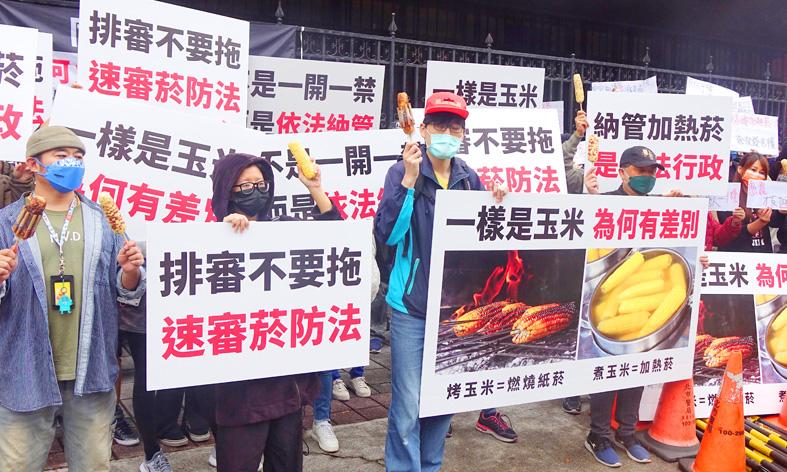Smoker rights groups yesterday protested outside the legislature in Taipei against a proposal to ban e-cigarettes.
Holding signs that read: “Consumers have rights, too,” “Give me the freedom to choose” and “Do not force me to smoke cigarettes,” protesters said the government should not impose a blanket prohibition against e-cigarettes and heated tobacco products (HTPs).
The government must respect the rights of smokers, they said, adding that it should offer people choices, instead of instituting an outright ban.

Photo: Liu Hsin-de, Taipei Times
The protest was in response to the legislature’s Social Welfare and Environmental Hygiene Committee considering changes to the Tobacco Hazards Prevention Act (菸害防制法) that would ban e-cigarettes and limit HTPs. Amendments to the Narcotics Hazard Prevention Act (毒品危害防制條例) to restrict e-cigarettes are also be considered by the Judiciary and Organic Laws and Statutes Committee.
One protester said that vaping devices, HTPs and flavored cigarettes should be regulated like regular cigarettes, with taxes and age restrictions for purchase.
“HTPs and e-cigarettes should be classified as tobacco products, just like the cigarettes sold at convenience stores,” said the protester, who asked that their name not be used. “We agree that the government should impose restrictions and rules, not permit sale to minors, no advertising, no online purchase and have health warnings.”
Separately, while discussing amendments to the Narcotics Hazard Prevention Act at the legislature, Deputy Minister of Justice Tsai Pi-chung (蔡碧仲) was asked about recent calls by advocates urging the government to permit medicinal cannabis.
Tsai said there is no plan to decriminalize cannabis, which remains classified as a category 2 narcotic.
Tsai said the judiciary is cracking down on all illegal drug use, including cannabis, and said it is illegal in Taiwan for YouTubers to post videos teaching how to grow marijuana.

Alain Robert, known as the "French Spider-Man," praised Alex Honnold as exceptionally well-prepared after the US climber completed a free solo ascent of Taipei 101 yesterday. Robert said Honnold's ascent of the 508m-tall skyscraper in just more than one-and-a-half hours without using safety ropes or equipment was a remarkable achievement. "This is my life," he said in an interview conducted in French, adding that he liked the feeling of being "on the edge of danger." The 63-year-old Frenchman climbed Taipei 101 using ropes in December 2004, taking about four hours to reach the top. On a one-to-10 scale of difficulty, Robert said Taipei 101

Nipah virus infection is to be officially listed as a category 5 notifiable infectious disease in Taiwan in March, while clinical treatment guidelines are being formulated, the Centers for Disease Control (CDC) said yesterday. With Nipah infections being reported in other countries and considering its relatively high fatality rate, the centers on Jan. 16 announced that it would be listed as a notifiable infectious disease to bolster the nation’s systematic early warning system and increase public awareness, the CDC said. Bangladesh reported four fatal cases last year in separate districts, with three linked to raw date palm sap consumption, CDC Epidemic Intelligence

US climber Alex Honnold left Taiwan this morning a day after completing a free-solo ascent of Taipei 101, a feat that drew cheers from onlookers and gained widespread international attention. Honnold yesterday scaled the 101-story skyscraper without a rope or safety harness. The climb — the highest urban free-solo ascent ever attempted — took just more than 90 minutes and was streamed live on Netflix. It was covered by major international news outlets including CNN, the New York Times, the Guardian and the Wall Street Journal. As Honnold prepared to leave Taiwan today, he attracted a crowd when he and his wife, Sanni,

Taiwanese and US defense groups are collaborating to introduce deployable, semi-autonomous manufacturing systems for drones and components in a boost to the nation’s supply chain resilience. Taiwan’s G-Tech Optroelectronics Corp subsidiary GTOC and the US’ Aerkomm Inc on Friday announced an agreement with fellow US-based Firestorm Lab to adopt the latter’s xCell, a technology featuring 3D printers fitted in 6.1m container units. The systems enable aerial platforms and parts to be produced in high volumes from dispersed nodes capable of rapid redeployment, to minimize the risk of enemy strikes and to meet field requirements, they said. Firestorm chief technology officer Ian Muceus said